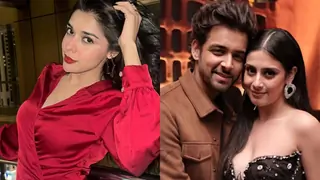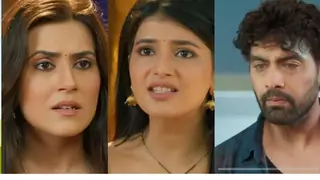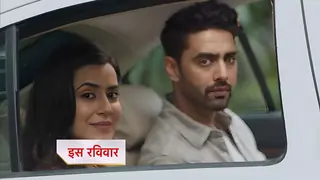The Sound of Silence
(By Sathya Saran. Filmfare, October '95)
I was still in frilly frocks and pigtails when love blossomed. 'Madhumati' made it happen. Its songs were an awakening... I was possessed by music. Of course, there earlier flings with music. Shankar Jaikishen's tunes for 'Shri 420'--especially "Mera joota hai japani... and all that. But this was an obsession.
And I wasn't alone. The songs had seized different generations-- even my mother, whose aversion to film songs was almost pathological. But a softness suffused her eyes when the songs of 'Madhumati' hummed from the radio.
And then, I saw the film. Singing every number loud and clear in the hall, much to the embarrassment of my teenaged cousin, I decided that love, and being in love, was the most divine of emotions.
It was years later, when names began to matter, that I realized that Salil Choudhury was the man behind the music... mine was no childish infatuation. Years later, I was to scour the shops of Connaught Place, seeking the EP of 'Anand.' And the songs of 'Rajnigandha' and 'Chhoti Si Baat' were to be on the top 10 of my personal hit parade.
And now Salil Choudhury is dead. Just weeks after I was supposed to meet him, on his visit to Bombay where I would realize a long- cherished dream of hearing the poet-composer unravel his new dreams.
The composer was a dreamer who could spin poetry and music in one composite tapestry. Melody was his main implement; often he'd write his own lyrics in Bengali, compose a tune and only then fit in someone else's lyrics--even if that meant erasing his own.
His music was a blend of the western classical (he grew up on Bach, Beethoven, and Mozart, and a bit of Chopin), folk ditties, and a smattering of the Indian classical. Yet, except for straight adaptations like "Itana na mujhse tu pyar badha"
(Chhaya) culled from Mozart's 41st* symphony or "Raaton ke saaye ghane" (Annadata) culled from Chopin, Salil Choudhury rarely let his influences show.
His roots were in Bengal and in IPTA (Indian Peoples Theatre Association), the progressive theatre movement which he actively supported throughout the 1940s. During his years in Bombay, he never forgot his debt to Bengali musical tradition, returning every year to Calcutta to compose songs for Lata Mangeshkar and Hemant Kumar for the puja season.
Salil Choudhury would say of Hemant Kumar, "If God ever decided to sing, he would do so in the voice of Hemant Kumar."
Hemantda first met Salil Choudhury when the latter was part of a four-member group which sang numbers with strong communist leanings. Musical they were but with a limited appeal.
Soon after, Salil Choudhury approached him with several fiery compositions. Hemant Kumar felt that all of them were too stridently militant except for a half-finished tune about a young girl who died in the Bengal famine. The partnership with Hemantda was on.
There was no looking back for Salil Choudhury. His songs were a rage, blared forth from loudspeakers especially during the pujas. As the composer's fame spread beyond Calcutta, Bombay and Bimal Roy's 'Do Bigha Zameen' beckoned. The communist petrel turned a softer socialist, evident in "Dharti kahe pukar ke" scored for the film.
Other offers followed. By the end of the '50s, Salil Choudhury was a Bombaywallah. His songs spanned all moods from the hopelessness which filters through Talat Mehmood's "Raat ne kya kya (Ek Gaon Ki Kahani)" to the hope-infused "Jago Mohan pyaare (Jagte Raho)."
And then there was 'Madhumati.' It was Bimal Roy again, recapturing through Salil Choudhury the essence of the melody of Bengal. This time, Salil was inspired by the verdant hillsides of Assam... where as a child he had roamed with his forest- officer father... and where now Bimal Roy would shoot his love story with a supernatural twist.
Over the years, the sights and sounds of nature had been the muse for Salil Choudhury. When the songs of 'Madhumati' were composed, the tweeting of birds, the flight of an eagle, and the patter of rain seemed to seep into the melody.
'Madhumati' fetched Salil Choudhury his first Filmfare Award in 1958. Though he could have ridden the crest of the wave of success, the musician went literally into hiding. His communist activities had come home to haunt him... he had become a hunted man.
Eventually, Bimal Roy's assistant, Hrishikesh Mukherjee, who was making his debut as a director with 'Musafir,' signed Salil Chowdhury. Salil's score for the film was in harmony with the soft, romantic, hesitant, episodic mood of the film. Another first was scored by 'Musafir.' It was under Salil's baton that Dilip Kumar sang his first song in tandem with Lata Mangeshkar.
A year later, Salil Choudhury struck out a new path--he composed the background score for BR Chopra's courtroom drama 'Kanoon.' The film was totally devoid of songs. Yet the music almost made the audience forget the lack of vocals.
As the years rolled, Salil Choudhury composed background music for B Copra's 'Ittefaq' and Yogesh Saxena's 'Plot No. 5.' Gulzar used his background score in 'Achanak'... one of the pieces was to later evolve into a full-fledged song for Gulzar's 'Mere Apne.' Later, Salil composed the background score for the poet- director's 'Mausam.'
A story goes that the tune of "O sajna (Parakh)" was sparked one rainy evening. The composer was listening to the swish of his car wipers when he was seized by inspiration. He worked out the lyrics in Bengali and offered the finished piece to Bimal Roy. When it was eventually recorded Shailendra penned the lyrics in Hindi and Lata Mangeshkar rendered the playback.
He took a gamble with the music of 'Annadata.' The song "Guzar jaaye din din din"... used a scale progression as a method... here was a marked departure from the accepted norms in film music. It was a difficult number which the composer wanted Kishore Kumar to sing because "Only he could give it 90 percent of its credibility." It's said that even Kishore Kumar was stymied; the song was recorded after 18 takes.
Came the 1970s and Salil Choudhury disappeared from Bombay's music scene. Perhaps because melody was out and noise was in…
It was after a long break that he reappeared with the score for the serial 'Kurukshetra' aired on Zee TV. He also composed the background score for Shakti Samanta's 'Ahankaar.' He was toying with other projects when illness claimed him. A blood clot in his brain stemmed his comeback; he had to go in for surgery.
All was well. The prayers of thousands of his fans and the loving ministrations of his wife Sabita and his daughters helped nurse him back to recovery.
And then tragedy struck. Even as he was listening to his daughter, Antara, singing at home, a fever took hold of him. He had to be rushed back to hospital. A deadly infection had overcome him in his convalescence.
His sons from America rallied around. There was a constant vigil at the nursing home in Alipore where he lay battling for his life. A specialist was called in from Bombay. But it was no use... death stilled the musician forever.
His music will live on. There must be many like me who will never let the memory dim, of the moment when on hearing "Dil tadap tadap ke keh raha," they discovered the emotion called love.

























